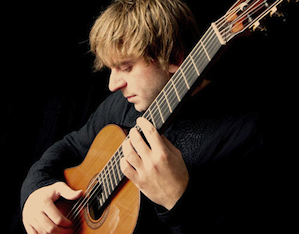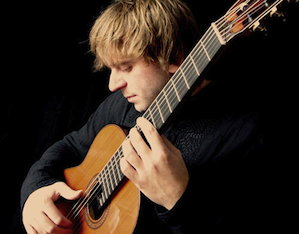
Polish guitarist Marcin Dylla has been poised on the verge of an important career since his 2007 triumph at the Guitar Foundation of America International Guitar Competition. His current tour, with high points at Carnegie Hall in New York and the Konzerthaus in Vienna, seems geared to substantiate the high expectations.
Other recent bids at guitar stardom have gotten bogged down in beautiful publicity photos accompanied by tried, true, and overexposed repertoire. Dylla programs emotionally and intellectually complex music and exhilarates his audience with brilliant, poetic performances enlivened by sensuous tone, rhythmic flexibility and deeply felt emotion. The movie star looks, spontaneously commented on by many women at the Green Room on Saturday, come across as a casual and incidental extra. The concert, which ended in a moment of absolute magic, was presented by the Omni Foundation.
The highlight of Dylla’s program was the San Francisco premiere of Magnus Lindberg’s monumental contribution to guitar literature, the 20-minute Mano a Mano. Lindberg, the New York Philharmonic’s composer-in-residence from 2009-2012, is one of the most sought-after composers of orchestral scores in the world.
Mano a Mano, composed in the classical three-movement concerto form, complete with room for a cadenza by the performer, is a colorful work. It draws the listener into its sound world with an open-string chord, followed by an undulating interval at the base of classical harmony, and finally a glissando rooted in the Medieval/Renaissance diabolus in musica, (devil in music) — the augmented fourth interval. In the opening four seconds, therefore, Lindberg refers to the nature of the guitar as well as to the entire history of Western classical music and its inherent tensions and conflicts. The piece powerfully evokes the complexity of human life, and Lindberg’s massive orchestral masterpieces.
Dylla played the compact theme with seductive aplomb and he played the kaleidoscopic extension of the material with humor, passion, earnestness, in a manner that emphasized the richness of the emotional story being told. Dylla has raw speed, technical dexterity, and command of color, but his performance style emphasizes a virtuosity much rarer and precious, based on emotional intelligence and flexibility. Dedicated to guitarist Timo Kohornen who advised the composer during composition and made a stellar first recording, Mano a Mano has found an ideal champion in Marcin Dylla. “Hats off gentleman, a genius!”
Dylla played with humor, passion, earnestness, in a manner that emphasized the richness of the emotional story being told.
Also on the program were Manuel Ponce’s Sonata Romantica, written in 1928 for Andrés Segovia, an homage to Franz Schubert; Anton Diabelli’s Sonata in F Major (1807), an excellent example of Viennese classicism in the style of Beethoven’s early piano sonatas and a technically demanding work few guitarists have the courage to undertake; and Enrique Granados’ Valses Poeticos, an extraordinarily beautiful Romantic work with veiled references to Domenico Scarlatti sonatas, Richard Strauss’s Der Rosenkavalier and Ravel’s Valses Nobles et Sentimentales. These are all substantial works, any one of which would stand out on a program. Dylla brought out their highly varied essences with ease and grace.
When it was time for an encore, Dylla came to the stage without his instrument and told us that after his last performance the promoter told him that his encore was too subdued and needed to be spectacular. Then, to the audience’s great amusement and delight, he proceeded to do a magic trick. He then returned with his guitar and played one of Rodrigo’s Tres Piezas Españolas. It was truly magical.

